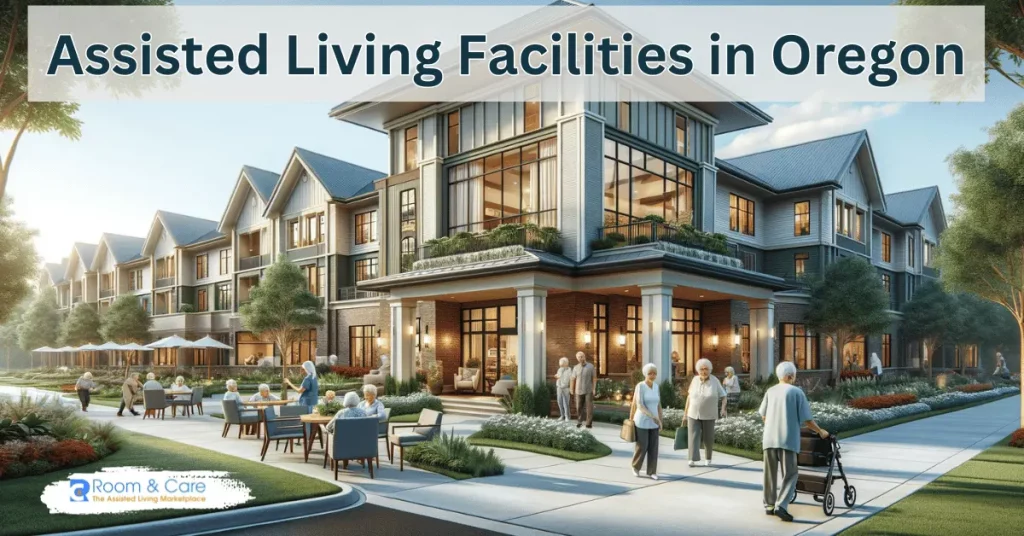

Oregon, a state celebrated for its natural splendor and vibrant communities, is also a leading region in providing exceptional care for its senior population. Among the various options available for elder care, Assisted Living Facilities (ALFs) play a pivotal role. These facilities offer a unique combination of attentive care, healthcare services, and enriching social and recreational activities, catering to seniors who seek a balance of support and independence. This article aims to provide an in-depth look at Assisted Living Facilities in Oregon, emphasizing their importance in the spectrum of senior living options and the distinct advantages they offer.
Oregon is home to over 610 Assisted Living Facilities. The average number of assisted living beds is approximately 67 beds. This significant number underscores the state’s commitment to providing diverse and accessible care options for its aging population. These facilities are designed to cater to seniors who require regular access to caregivers and medical assistance but still wish to engage actively in various local activities and social opportunities.
The cost of residing in an Assisted Living Facility in Oregon can vary considerably, ranging from approximately $2,196 to $5,463 per month. This variation largely depends on the facility’s location, the type of care provided, and the amenities offered. The Salem area is noted for having some of the more affordable options, while the Medford metropolitan area ranks among the pricier locations. It’s essential for seniors and their families to consider these cost factors when choosing an appropriate ALF, balancing budget constraints with the quality and range of services required.
Assisted Living Facilities (ALFs) in Oregon exhibit a wide range of architectural styles, from modern, purpose-built complexes to renovated historical buildings. This diversity caters to different aesthetic preferences, ensuring that residents can choose a facility that feels like home. Many ALFs are designed with accessibility and mobility in mind, featuring single-level layouts or equipped with elevators and ramps for ease of access.
Safety features are paramount in these facilities. Emergency call systems, smoke detectors, and secure entrances are standard. Additionally, living spaces are often designed or modified to accommodate seniors with mobility challenges, including wider doorways, walk-in showers, and handrails in critical areas.
Oregon’s ALFs are known for offering personalized care plans that cater to the individual needs of each resident. These plans often include medication management, assistance with daily living activities such as bathing, dressing, and grooming, and coordination with healthcare providers for ongoing medical needs.
Many ALFs in Oregon provide specialized care for residents with specific health conditions, such as Alzheimer’s and other forms of dementia. These facilities have staff trained in memory care and offer environments and programs designed to enhance cognitive function and overall well-being.
Amenities in Oregon’s ALFs are designed to enhance residents’ quality of life. Common amenities include well-maintained outdoor spaces like gardens or courtyards, fitness centers, and communal areas for social activities. Many facilities also offer beauty salons and barbershops on-site, adding convenience and a sense of normalcy to residents’ lives.
Beyond basic care, these facilities typically provide a range of services aimed at promoting an active and engaged lifestyle. This includes organized social events, educational programs, recreational activities, and various wellness programs. Some ALFs also offer transportation services for off-site activities and medical appointments, ensuring residents remain connected to the broader community.
Nutrition is a key focus, with many Oregon ALFs offering meal services that cater to various dietary needs and preferences. Dining programs are designed to be both nutritionally balanced and socially engaging, with communal dining spaces where residents can enjoy meals together.
Assisted Living Facilities in Oregon offer a diverse array of living options, care services, and amenities designed to meet the varied needs and preferences of seniors. From the physical design of the facilities to the comprehensive care and amenities provided, these ALFs are geared towards creating a safe, comfortable, and engaging environment for their residents.

In Oregon, Assisted Living Facilities (ALFs) are expected to maintain high standards regarding staff qualifications. Caregivers and staff members are typically required to have appropriate training and certifications, particularly in areas like elder care, medication management, and emergency response. This ensures that residents receive professional and competent care tailored to their needs.
Oregon regulations stipulate strict staff-to-resident ratios in ALFs. This ratio is critical for ensuring that each resident receives adequate attention and care. By maintaining a lower ratio, facilities can provide more personalized care, which is crucial for residents’ well-being and overall satisfaction with the facility.
Continuous training and development are emphasized to keep staff updated on the best practices in elder care. This includes regular workshops and seminars on new care techniques, changes in healthcare policies, and updates on state regulations, ensuring that the care provided is always in line with the latest standards.
Oregon’s ALFs are recognized for offering specialized care programs tailored to individual health conditions, such as memory care for residents with dementia. This specialization ensures that all residents, regardless of their specific health challenges, receive the care they need in a supportive environment.
Inclusivity is a cornerstone of the philosophy in Oregon’s ALFs. Facilities strive to create an environment that respects and caters to diverse backgrounds, beliefs, and lifestyles. This approach ensures that every resident feels welcome, respected, and part of the community, regardless of their cultural, religious, or personal identities.
Life in Oregon’s ALFs is structured to provide a balance between care and an engaging lifestyle. Daily activities are designed to cater to a wide range of interests and abilities, ensuring that residents have the opportunity to engage in hobbies, social events, and physical exercise. This focus on a holistic lifestyle contributes significantly to the overall well-being of the residents.
Creating a sense of community is a key aspect of ALFs in Oregon. Facilities often have communal areas where residents can socialize, dine together, and participate in group activities. This emphasis on community helps prevent isolation, promoting social interaction and fostering friendships among residents.
Oregon’s ALFs offer a degree of personalization and flexibility in daily routines. Residents typically have the freedom to choose how they spend their day, which activities they participate in, and what meals they prefer, reflecting their independence and personal preferences.
Assisted Living Facilities in Oregon are characterized by their highly qualified staff, specialized care services, and inclusive practices, all designed to create a supportive and engaging environment for seniors. The everyday life in these facilities is focused on promoting social interaction, personal growth, and a sense of community, ensuring that residents enjoy a fulfilling and dignified lifestyle.

When choosing an assisted living facility (ALF) in Oregon, it’s crucial to understand the available mechanisms for addressing and resolving complaints. This is not only essential for peace of mind but also serves as a marker of the facility’s commitment to quality and resident satisfaction.
How to File a Complaint in Oregon’s ALFs:
If you have concerns or grievances about an ALF, Oregon provides straightforward channels for voicing them:
Phone Contact: You can file a complaint by calling 844-503-4773. This helpline connects you to the responsible regulatory body overseeing ALFs in Oregon, ensuring your concerns are heard by the right authorities.
Email Communication: Alternatively, complaints can be submitted via email to licensing.complaint@odhsoha.oregon.gov. This address is managed by the Oregon Department of Human Services’ Office of Licensing and Regulatory Oversight or a similar entity, ensuring a formal and traceable record of your complaint.
Detailing Your Complaint: Whether you opt for a call or email, providing as many details as possible is vital. Include specific incidents, dates, names of staff involved, and other relevant information. Detailed accounts aid in thorough investigation and resolution of issues.
Quality assurance in Oregon’s ALFs isn’t just about handling complaints; it’s about a commitment to continuous improvement. High-quality facilities regularly assess their services, seek feedback from residents and families, and adhere to evolving state regulations and industry best practices.
When considering an ALF, ask about their grievance handling processes. A facility’s transparency and effectiveness in managing complaints are indicative of its overall quality and dedication to resident care.
Selecting the right Assisted Living Facility (ALF) in Oregon is a significant decision, one that impacts the well-being and happiness of seniors. This process involves more than just comparing costs and services; it’s about finding a place that resonates with the personal needs and preferences of the individual.
Families and seniors should weigh various factors, including the location, the level of care provided, the quality of life at the facility, and, importantly, the costs involved. Understanding these elements and how they align with the senior’s requirements is crucial for a decision that ensures comfort, care, and peace of mind.
In the age of information, resources like Room & Care can enhance this decision-making process. Offering a direct line to available rooms and clear, upfront information about facilities, this platform can be a valuable tool in the search for the right ALF. It helps families compare options efficiently, saving both time and potentially reducing costs by circumventing traditional referral fees.
However, the value of personal visits to potential ALFs cannot be overstated. These visits offer insights that cannot be captured through online research alone. They provide a real sense of the community, the staff’s approach to care, and the overall atmosphere of the facility.
Ultimately, the choice of an Assisted Living Facility in Oregon is about finding a new home where seniors can thrive. It’s a decision that reverberates through every aspect of their daily lives. Therefore, taking a measured, well-researched approach, supplemented by helpful tools and resources, is key to making an informed choice.
By carefully considering these various aspects and utilizing all available resources, families can navigate this important decision with confidence, ensuring that their loved ones receive the best possible care in their golden years.